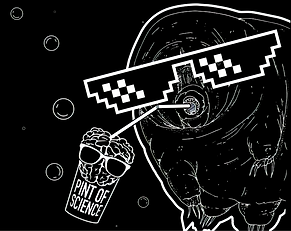Research and Volunteering
CRISPR/Cas9-mediated Sterile Insect Technique
Mediterranean fruit flies (Ceratitis capitata) are invasive pests that destroy fruit crops. During my master's thesis project at Imperial College London, I investigated potential CRISPR/Cas9-mediated improvements to the existing population control techniques.

Pint of Science 2023
During my time at Imperial, I was a part of the Imperial team hosting Pint of Science 2023 - Beautiful Mind team. My team and I organised and hosted talks by London-based psychologists. The event was held over three days at The Lucas Arms on topics in neuroscience, psychology and psychiatry

Women in STEM
I joined the iGEM Community initiative called women in STEM in 2021.

Green Corrosion Inhibitors
Many biological materials have been previously shown to have good corrosion inhibition properties. In the summer of 2020, I worked with a team of undergraduate researchers to compile and summarise the efficiency of different inhibitors on various metals.

Extremophile Microbes from the Himalayas
Investigated for possible anti-freeze and anti-microbial peptides released by extremophile micro-organisms found in the extremely chilly temperatures of the Himalayas. This involved growing bacteria and fungi from Himalayan soil samples using standard aseptic techniques.

Pregnancy and Urine Glycomics
Investigated glycan profiles of urine samples collected throughout various stages of pregnancy under the guidance of Prof Stuart Haslam and Prof Anne Dell.

Azurin as a potential therapeutic for Breast Cancer
As my undergraduate thesis, I worked on p28, a peptide shown to have therapeutic effects. The binding affinity of p28 was tested on upregulated proteins in breast cancer cells. For optimisation of protein ligand interactions, we performed over 400 single site amino acid substitutions and scored their affinity.

Detoxification of Cottonseed Meal
Cottonseed meal is a major waste product of the textile industry, but a great source of proteins, fibre and fats. To potentially be used as a dietary supplement, a toxin inherently found in raw cotton seeds, gossypol, needs to be removed. My team and I developed a pipeline to characterise an enzyme capable of breaking down gossypol into non-toxic byproducts.

Biome
Biome is a mechatronically powered light orb which uses organic waste to generate green energy. It uses luciferin protein-based bioluminescent microorganisms to produce light in a self-sustained environment at its core. It also acts as a waste management system with an inbuilt microbial fuel cell that generates the required energy.
